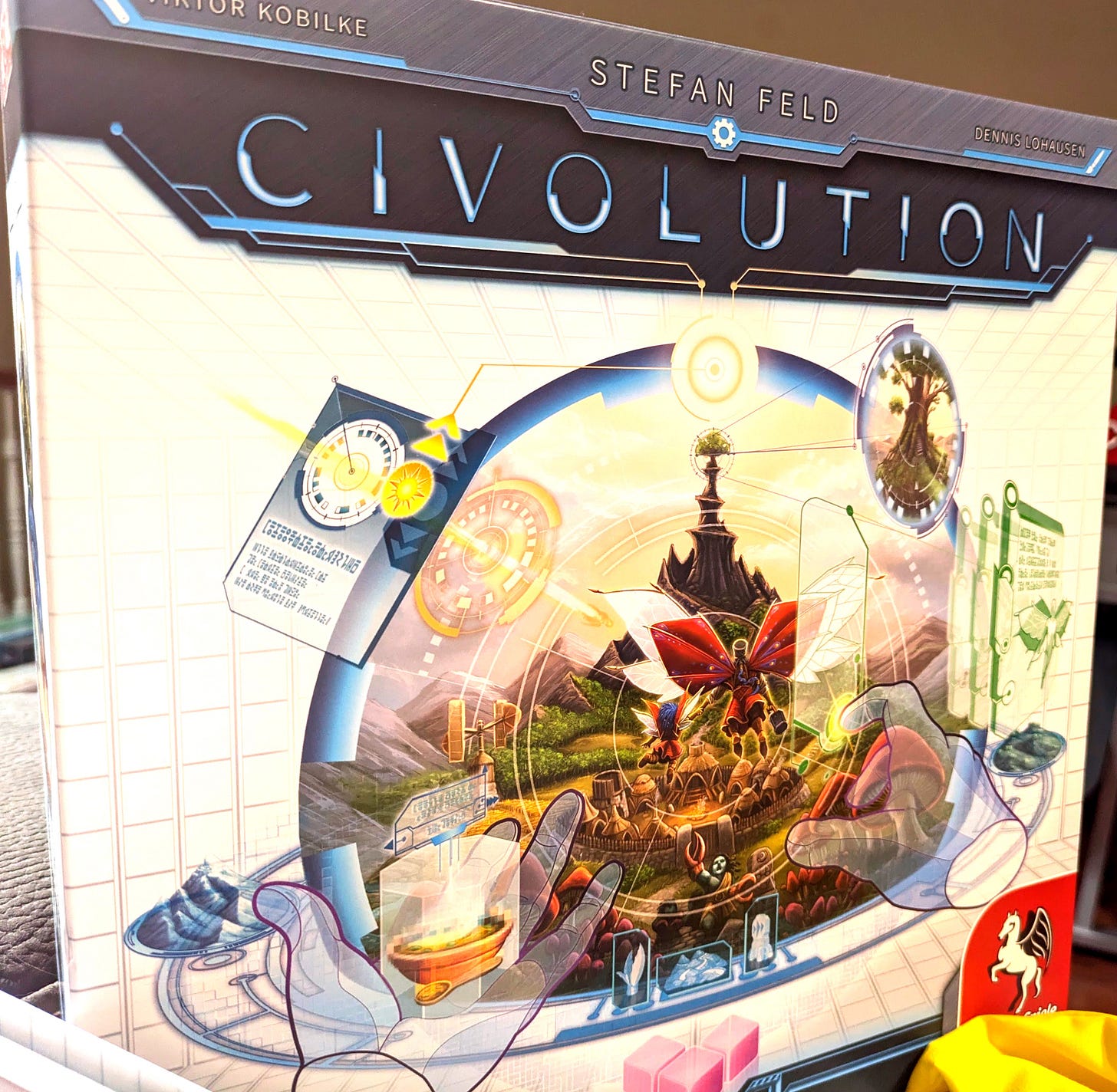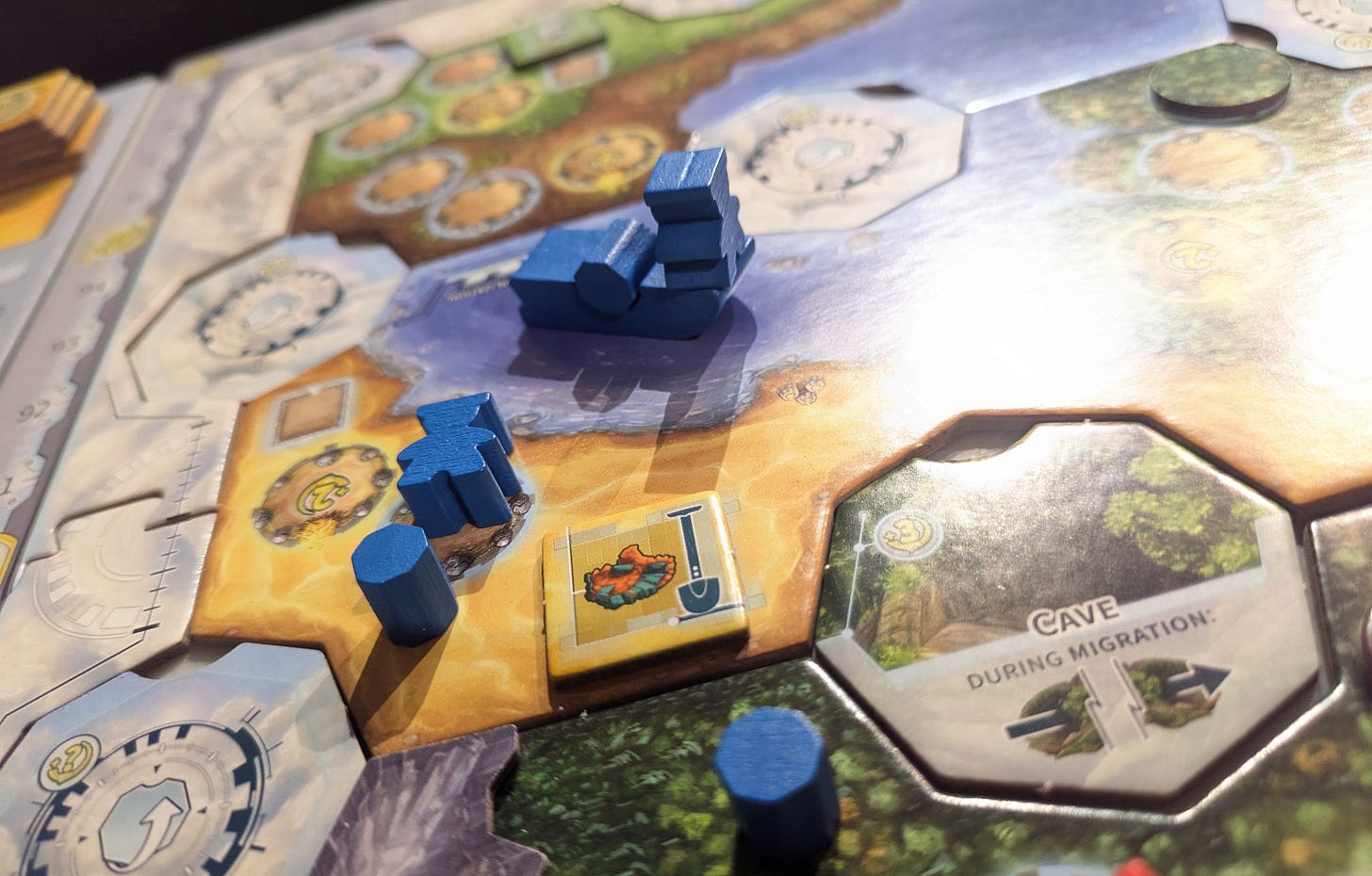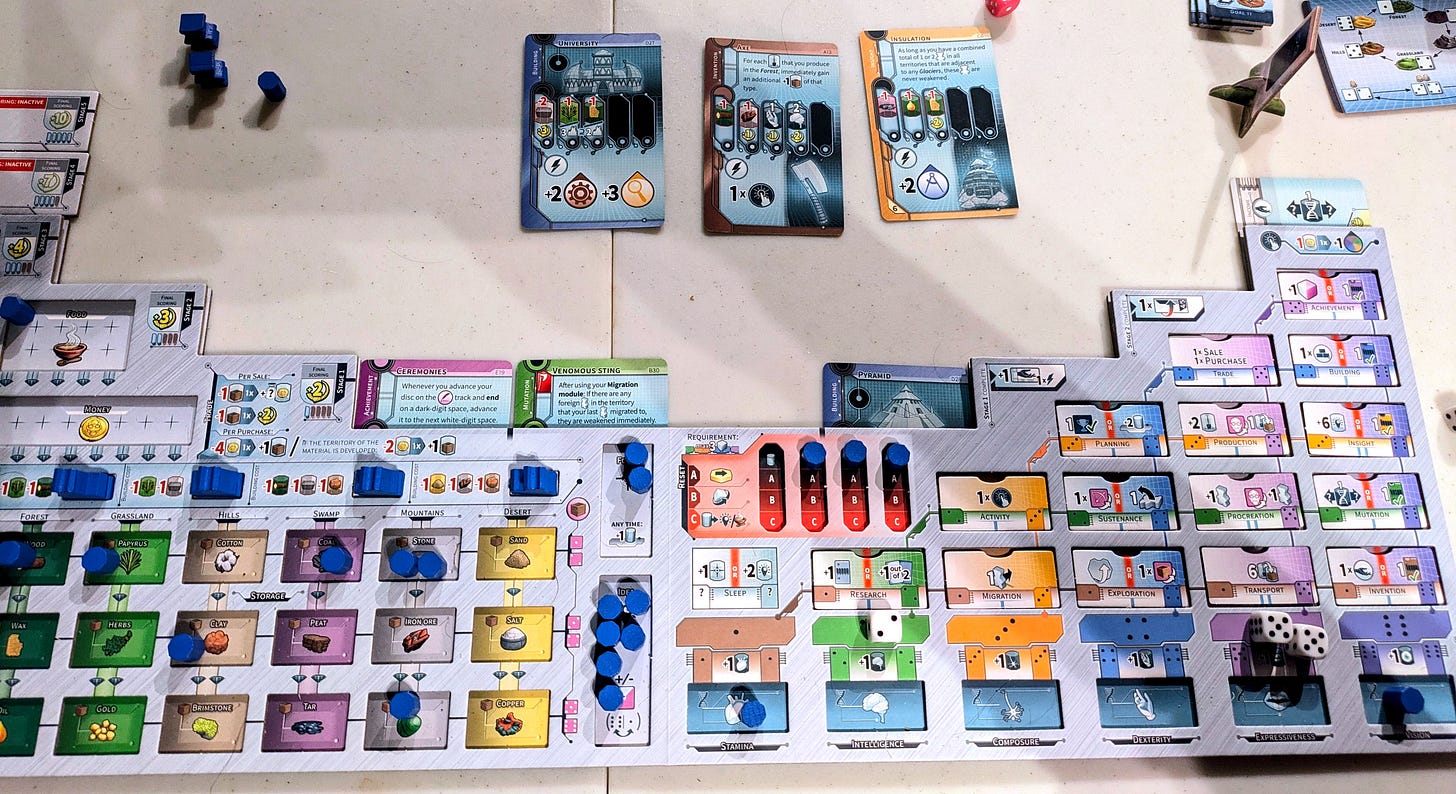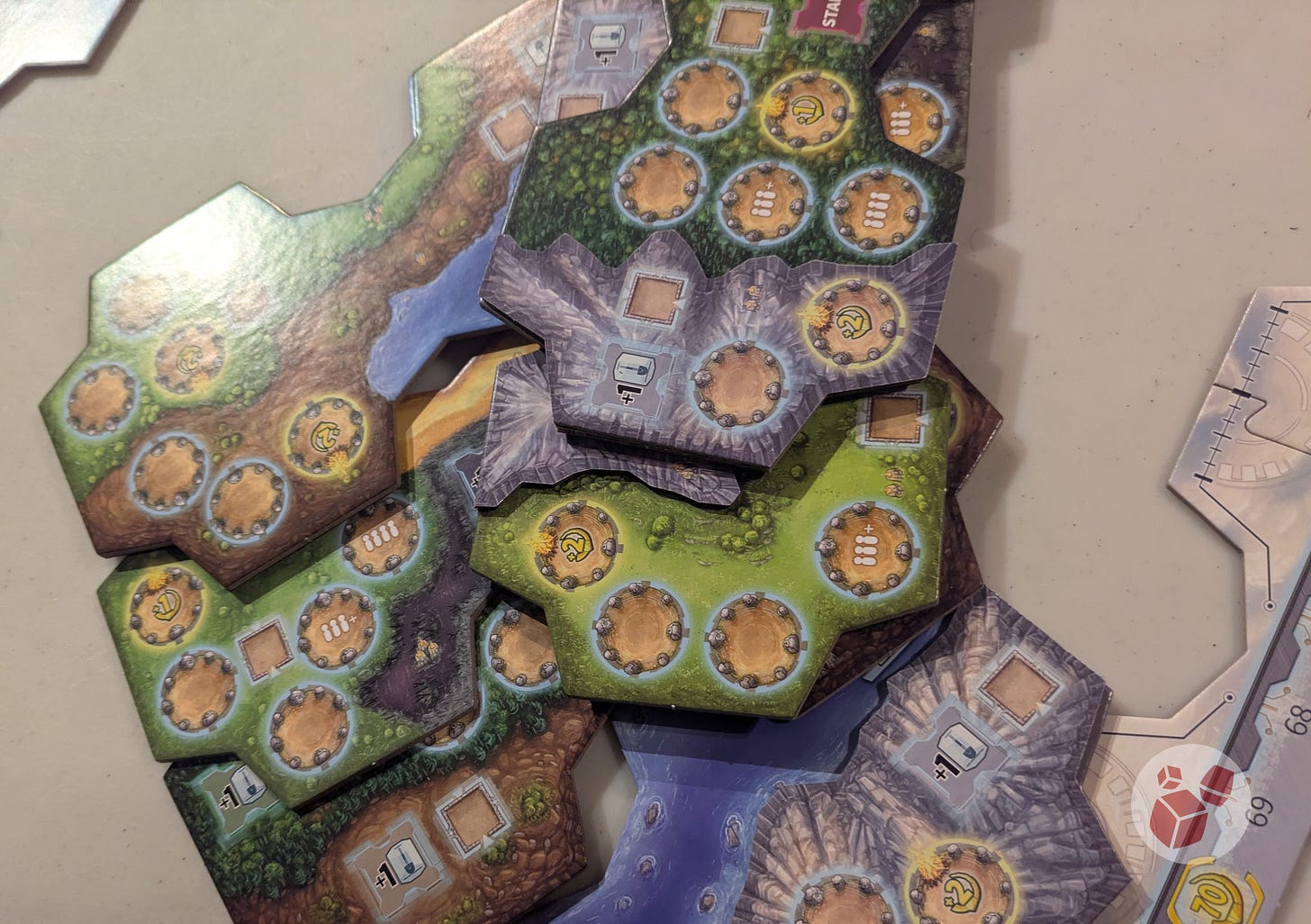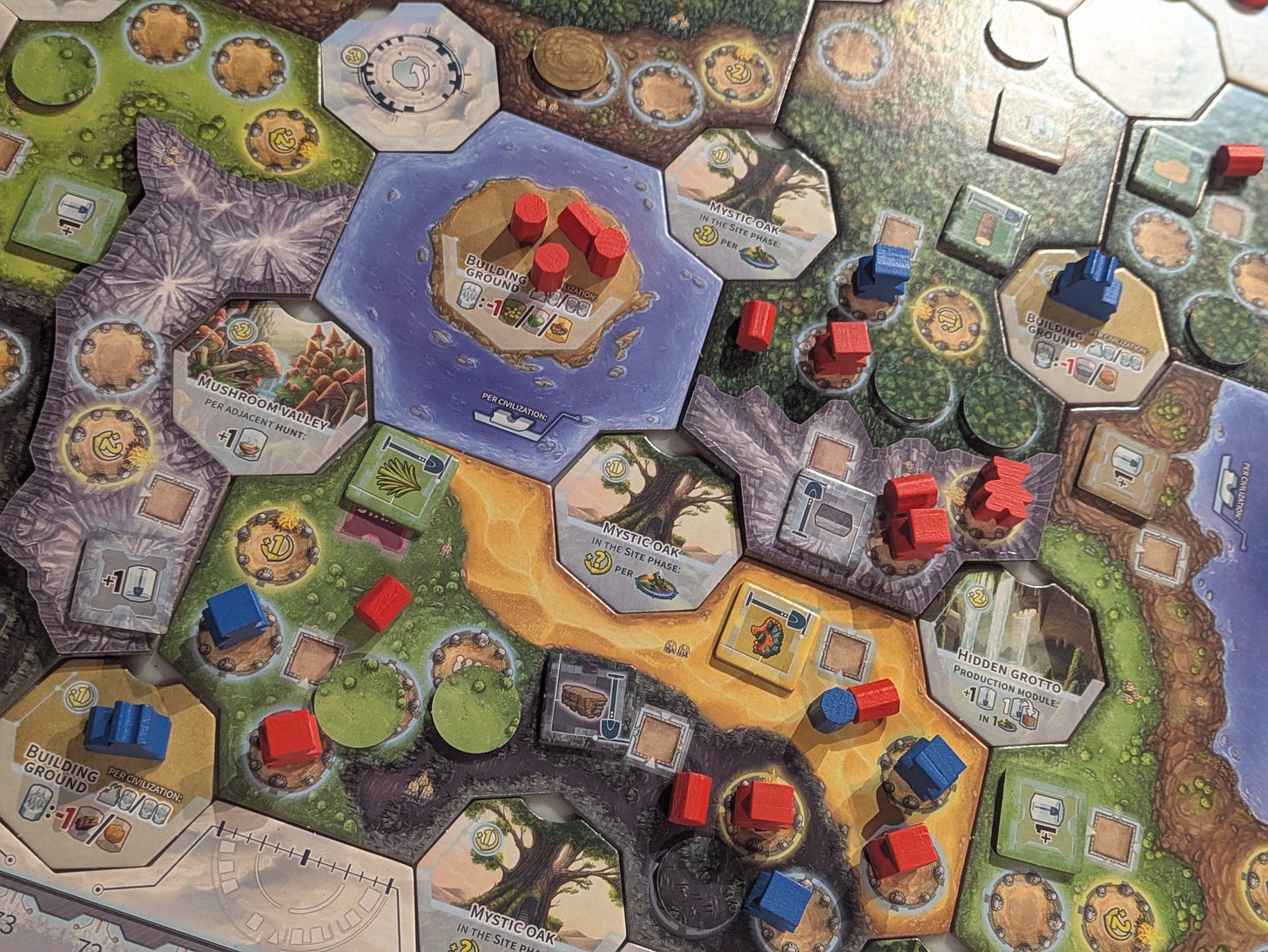Building and Evolving Your Civilization in Civolution: A Strategic Challenge
Civolution blends dice mechanics with civilization-building, offering strategic depth, unpredictable gameplay, and high replayability. Perfect for fans of euro-style games.
Civolution, the latest creation from renowned designer Stefan Feld, presents players with a medium to heavy euro-style experience centered around a dice selection mechanism that drives actions.
In this game, you’ll construct your own civilization, exploring territories, gathering resources, and overcoming obstacles. With its unique combination of futuristic themes and strategic decision-making, Civolution challenges players to evolve their civilizations in an unpredictable world.
I must confess, the box art immediately captured my attention with its striking visual appeal. As an enthusiast of civilization-themed games, I was naturally drawn to it. My anticipation was especially heightened given my longstanding interest in Feld's earlier work, particularly The Castles of Burgundy.
Theme
The box design features a striking visual design that blends futuristic and civilization-building elements.
Showcases a fantasy world with technological motifs, reflecting the game's hybrid "Civilization" and "Evolution" concept. The artwork displays a panoramic view of an evolving civilization, panel-like interfaces suggesting the game's strategic decision-making aspects.
Despite its fantasy theme, the thematic elements integrate seamlessly with the gameplay mechanics. Player board resembles a computer control system, where players make strategic decisions about which actions to activate, directly influencing how their civilization develops and evolves over time.
You can build farms for food, build boats and even migrate to explore new territories, and gather additional resources to help you evolve your civilization. Even the weather plays a role, sometimes benefiting you, but other times devastating your tribe if it gets too hot or cold.
Exploring new territories is a double-edged sword—while it can lead to valuable discoveries, it also comes with risks. Uncovering a volcano will destroy any adjacent farms, removing them permanently from the game, just as a real volcano would devastate everything in its path.
Civolution’s theme can also hard to grasp, with some elements feeling disconnected or lacking clear integration.
For example, when performing the reset action—triggered once you've used all your dice and actions—it refreshes your dice pool and advances the round tracker. Thematically, this could symbolize rebooting control systems to initiate a new cycle of commands.
Expanding your tribes doesn’t truly convey the feeling of growing a civilization. While it provides benefits by increasing resource production, which in turn helps you acquire specific types of fantasy research cards or explore new tiles, it doesn’t offer much beyond that.
The overall theme gives a sense of evolving your civilization, but in a more abstract way rather than a deeply immersive experience.
Final score: 7/10
Mechanics
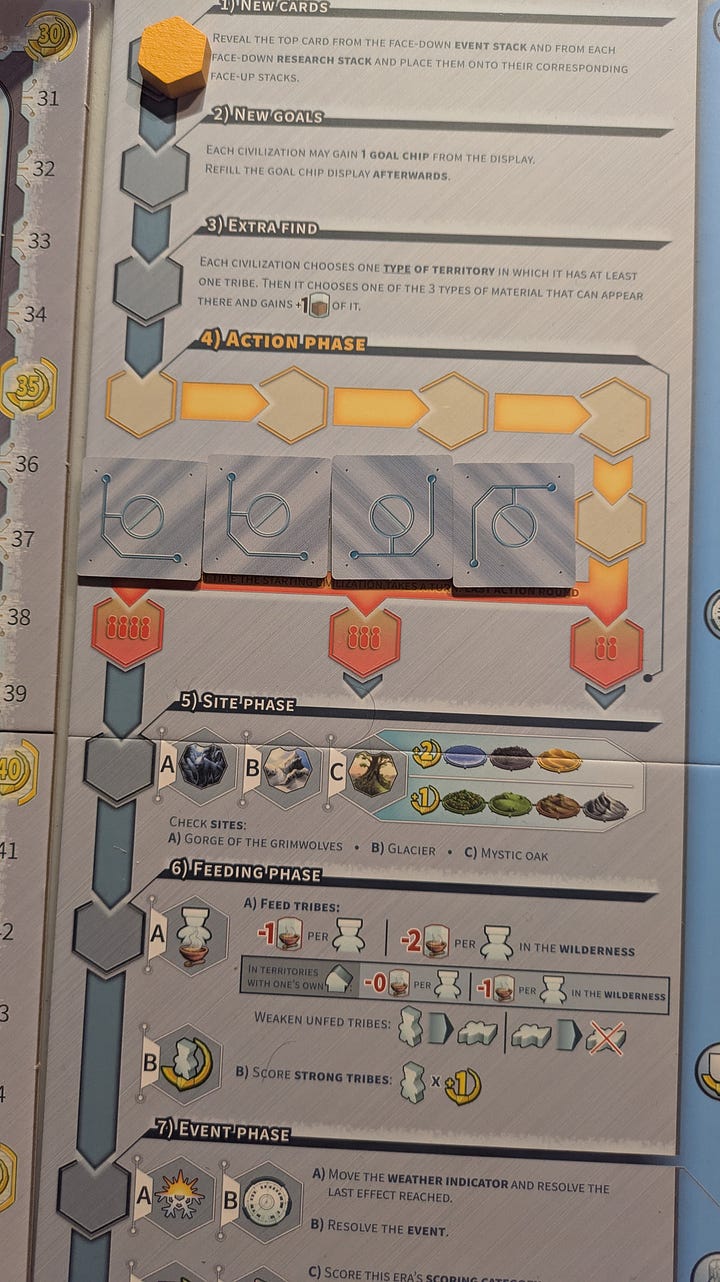
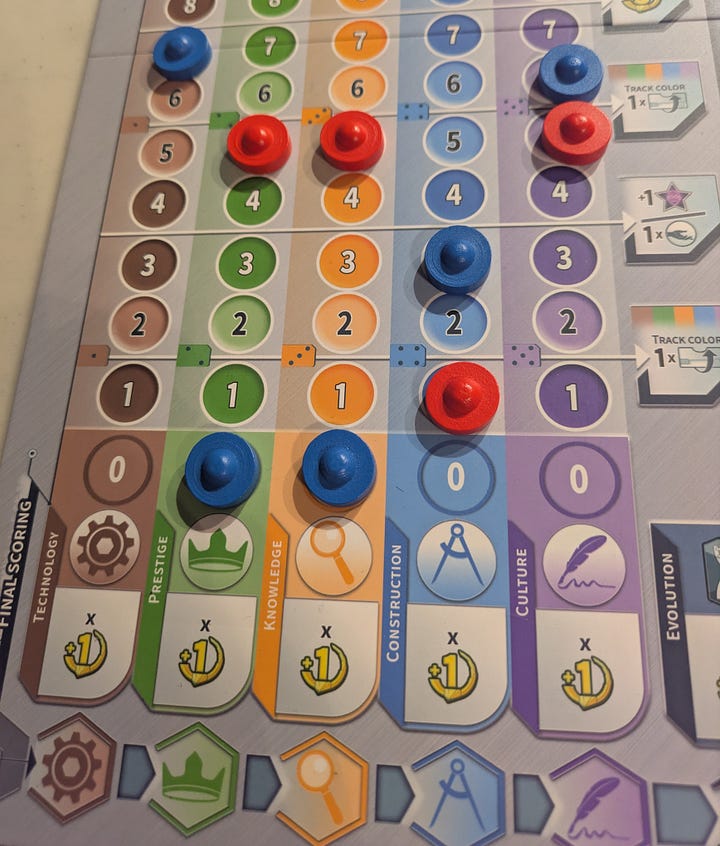
This is the first euro game I’ve played where dice serve as the core mechanism for determining available actions. Interestingly, Dune: War for Arrakis has a similar concept, though it’s not a euro game. The Castles of Burgundy also incorporates this mechanic, but I haven’t had the chance to play it.
The dice system adds a thrilling mix of excitement and tension—I’m always eager yet nervous to see my roll, hoping for the perfect actions. When luck isn’t on my side, I have to adapt quickly and find creative ways to make the best of my results.
Fortunately, there are ways to mitigate bad rolls. The game includes an idea marker, which acts as a wild die that can be changed to any number. Thematically, it represents a civilization having a breakthrough, allowing them to take the necessary action despite the randomness of the dice.
Once you decide on an action, you must place two matching dice on the corresponding action module.
Actions allow you to conduct research, adding a research card to your hand, or assign your tribes to produce resources. These resources must then be transported to your storage console, enabling you to play research cards. In turn, these cards help you advance on the research track or unlock other strategic opportunities.
Overall, I enjoy how the game requires you to take specific actions to build toward your goals. However, obstacles arise that slow you down, forcing you to adapt and find new strategies to keep evolving your civilization.
Final score: 8.5/10
Gameplay
During my first game, I felt completely lost, taking actions without fully understanding their purpose. I constantly flipped through the rulebook, trying to grasp what each action did. But after going through them all, everything started to click, and the gameplay began to feel intuitive.
Civolution's complexity is rated 4.2/5, and I completely agree. While the actions are easy to learn, the real challenge lies in choosing the right ones—making strategic decisions that will lead to better outcomes and long-term success.
While Civolution isn't an asymmetric game— that might disappoint fans of that mechanic—the sheer number of paths and strategies available more than makes up for it.
At its core, Civolution is a point salad game. You rack up points by progressing on the track, completing Era-end objectives, and interacting with building cards, income chips, and goals placed in the staging area.
It's easy to overlook certain aspects while playing—I’ve sometimes forgotten to resolve an event card for the era or missed the chance to build a farm to feed my tribes. Or those goals that i choose initially which slipped my mind.
Rolling the dice adds an element of luck needed. As you’ll need the right results to take the best actions. It can be frustrating when you're aiming to build a specific card that can help you profess on the track, only for the dice to work against you.
One notable aspect of this game is that it feels largely like a solitaire experience, with minimal player interaction. Your opponents' actions rarely influence your strategy. However, the reset action adds some tension by potentially shortening the era and limiting the actions.
Final score: 8
Replayability
The main board that contains territories involves arranging eight continent tiles along with 24 exploration tiles, which must be assembled in a puzzle-like fashion.
These modules can be position in any configuration. The modular board layout ensures each play features a unique geographical layout, creating varied tactical opportunities for the different tribes.
The material exploration tiles are shuffled and placed face down in specific territory areas. As you become more familiar with the game, you'll know these materials and exploration tiles are out there—but you won't know exactly when or where they will appear.
The randomness of the dice adds a layer of unpredictability—you may need to pivot your strategy or find yourself stuck, struggling to decide the best course of action.
Should you focus on procreation to expand your territory, paving the way for future migrations?
Or perhaps prioritize the build action to construct a building card, advancing your progress track and filling up your staging column?
Maybe a Production action is the way to go, though you'll eventually need to transport those resources to your player board.
The solo bot, V.I.C.I, plays differently in each game. It uses the same dice mechanics as a human player, adding a significant level of randomness to its actions.
In some games, the bot focuses on procreation and migration actions, while in others, it races up the progress track, scoring points rapidly. The varying difficulty levels offer unique challenges, making each playthrough unpredictable. I haven’t yet tackled the mid or higher difficulty levels, as even the easy mode has proven frustratingly tough to beat.
Overall the game offers a wealth of strategic depth, with countless ways to achieve victory. However, success requires a well-balanced approach—you can’t rely on just one aspect. This challenge keeps the game engaging, making you want to play it again and again.
Final score: 9
Art & Production Quality
Overall, the game is on the pricey side, but given its quality, it’s one of the nicest purchases I’ve made since Endless Winter.
The player boards are dual-layered, with insets for markers and action modules. When packing up, you can simply fold the board in a specific way, keeping all action modules in place without needing to repackage them separately.
All markers are neatly stored in dedicated storage boxes. The game also includes three color-coded material bags for goal, income, and attribute chips, which serve as both storage and a convenient way to redraw tokens during gameplay.
Design and theme come together seamlessly in Civolution through its stunning board and carefully crafted components. The visual elements aren’t just for aesthetics—they reinforce the game’s civilization-building narrative.
The detailed board layout, along with tokens representing boats, farms, and other structures, makes it feel like you're watching a village come to life. Every piece serves a thematic purpose, immersing players in the process of expansion, resource management, and survival.
Final score: 9.5
Pros
Replayability is high with many paths of victory.
Components quality & art very appealing. Especially the main territory board.
Rolling dice for actions keeps the anticipation high, as you're always eager to see what options you'll have next.
A multitude of objectives to complete creates a mental challenge, pushing players to optimize their strategy for maximum points.
Cons
The player board may seem overwhelming, offering numerous choices that may slow down decision-making.
More tactical than strategic—the game is constantly shifting, and it can sometimes feel like you're not making progress.
The game has a solitaire-like feel, with minimal player interaction.
This isn't a typical civilization-themed game—it requires an open mind.
Final Thoughts
This is the most addictive euro game I’ve played since the Imperium series (Horizons/Legends/Classics).
It’s a crunchy, brain-burning game with a deep solo mode and heavier gameplay. The dice rolling adds a unique twist, offering countless decisions that make it stand out from the rest.
I’d probably avoid playing this game with 3 or 4 players since it’s more of a sandbox experience with minimal interaction, which could also make it feel quite long. That said, if I ever come across experienced players, I might give it a shot.
The game game offers unpredictable and tactical, this game keeps you adapting, rethinking, and making the most of every roll. If you love chaos and the thrill of uncertainty, you’ll keep coming back for more.


